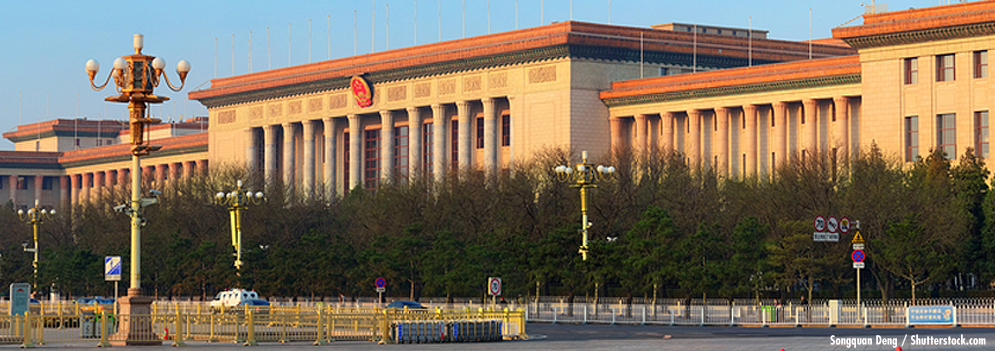China's National People's Congress (NPC) recently ended its annual session, a 10-day event in which nearly 3,000 delegates gather to pass laws, approve policies and discuss Asia's economy. One of the biggest announcements made at the session was by Premier Li Keqiang, who said the country's economic growth target would be lowered to nearly 7 percent.
We discussed the annual session results along with China's economic and environmental plans with Rory Truex, assistant professor of politics and public affairs at the Woodrow Wilson School. Truex studies comparative politics, focusing on Chinese politics and non-democratic regimes.
Q. What is your reaction to Premier Li Keqiang's announcement?
Truex: It’s important to remember that China's population has been growing at breakneck speed for more than 30 years now, averaging about 10 percent per year since 1978. More than 500 million people have been lifted from poverty in that time period. A slowdown is inevitable of course, and the lower 7 percent growth target represents the government’s effort to set reasonable expectations and establish a “new normal.” Premier Li Keqiang noted this recently, adding 7 percent growth “is equivalent to the total size of a medium sized-country.” The new leadership is continuing the push to restructure the economy— increasing domestic consumption, reducing pollution and curbing powerful state-owned enterprises, and this will bring some growing pains.
Q. The NPC annual session has been widely criticized, called a "rubber stamp" parliament by some. Do you agree with this sentiment?
Truex: Nearly every single article about the NPC in the Western media uses the words “rubber stamp.” I’ve grown tired of the phrase, as I find it overly simplistic. It is true that in its entire history, the full plenary session of the NPC has never voted anything down, which is the definition of a rubber stamp. The Congress is also packed with Communist Party of China (CCP) members, which usually occupy around 70 percent of all seats. Sometimes observers take this as evidence that there’s no contention or debate in the Chinese political system, but this overlooks the unique consensus-based nature of China’s policy processes. Any law that goes to the NPC has actually gone through several rounds of internal debate among top leaders, the State Council, relevant ministries and legislative committees in the NPC. Only laws that have garnered consensus are put up for a vote, and so it is no surprise that everything gets “rubber stamped” through. In my mind, it is more interesting to focus on how bills are introduced and debated, rather than this relatively meaningless voting process.
 Q. Premier Li also promised to work harder to fight pollution, an issue of great concern to the Chinese public. Yet, China banned "Under the Dome," a documentary posted on YouKu that garnered hundreds of millions of views on Chinese websites with days of its release. What do you make of this?
Q. Premier Li also promised to work harder to fight pollution, an issue of great concern to the Chinese public. Yet, China banned "Under the Dome," a documentary posted on YouKu that garnered hundreds of millions of views on Chinese websites with days of its release. What do you make of this?
Truex: This was a really interesting development. To me, the whole thing reflects that some government infighting on the environmental issue is going on. The documentary was originally featured on the website of the "People’s Daily" – the official government website – which suggests it had the tacit support of at least some actors. Chen Jining, the new Minister of Environmental Protection, praised the film as China’s version of "Silent Spring." It also was strategically released – either by the documentarian Chai Jing or her supporters – right before the annual NPC meetings. My hunch is that this was a play by those CCP leaders sympathetic to environmental reform to drum up public interest in the issue, further weakening the position of polluting industries. The fact that the video was ultimately censored reflects another reality of Chinese politics: too much public concern on any issue can endanger regime stability.
Q. What is the public's perception of the NPC? Your recent research shows that Chinese "netizens" – particularly less educated, politically excluded citizens – are more satisfied with the NPC after participating in online policy forums. Can you explain your results? How is this an advantage for the NPC?
Truex: One of the recent trends in Chinese politics is the rise of public participation mechanisms – online comment portals, legislative hearings, expert argumentation meetings and the like. In a new paper in Comparative Political Studies, I conducted a survey experiment where I randomly exposed Chinese citizens to an NPC public participation channel to see whether this had an effect on perceived legitimacy. I find that this “public participation treatment” generally increases satisfaction with the central government and general feelings of responsiveness, but that this effect is limited to less educated citizens who are excluded from the Communist Party. The takeaway is that these sorts of consultative institutions can help address the government’s legitimacy deficit, but that it will have to do more to meet the expectations of its more demanding citizens.
WWS Reacts is a series of interviews with Woodrow Wilson School experts addressing current events.


